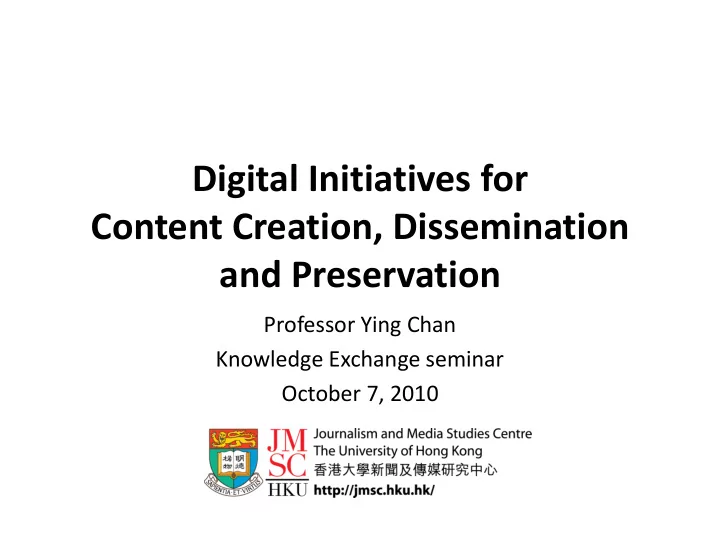

Digital Initiatives for Content Creation, Dissemination and Preservation Professor Ying Chan Knowledge Exchange seminar October 7, 2010
Background: Digital a way of life at the JMSC • Digital platform is incorporated in all courses for learning and teaching • Convergent media skills mandatory for all students; considered basic requirement for communicative and media literacy • Digit course sites for knowledge sharing maintained by individual faculty • A nurturing and learning environment to promote digital culture • A young, talented and passionate team of TAs and tech assistants
The JMSC dynamic tech team The JMSC A team of TAs and tutors who are smart, digital savvy, and passionate. They are always ready to assist
The digital culture • Multimedia • Interactive • Participatory, collaborative and multi- disciplinary
Collaborative Creations • The Asian Business leader series • Endowed professorships • Video for Research Services • ABC on campus • Live streaming events and conferences CSCL2011
Case One: The 1911 Project
The 1911 Project • Photo Exhibit – curated by Pulitzer-award winning photographer Liu Heung Sheng – 86 historic photos on the 1911 revolution – HKU and 10 mainland China museums joint exhibit • Book publication – 400 photos – 5 editions, Chinese and English – Eng edition published by HKU Press and JMSC
1911: digitizing cultural assets • Photos sourced from more than 20 private and public collections worldwide • Historic photos digitized for preservation and dissemination • Permission obtained for use of digital files • Digital photos repaired and restored • Deliverables: exhibits, books, an archive of digital photos that is accessible world wide
Exhibit received overwhelming media response
Case two: The D-Kunqu Project
What is Kunqu • A form of Chinese traditional theatre, an artistic blend of literature, history, music, and dance • Known as the ‘mother’ of Chinese Opera forms, Kunqu dominated Chinese theatre from the 16th to 18th centuries. • By the mid 20 th century Kunqu had nearly died and was almost lost completely during the Cultural Revolution.
• Kunqu survived and enjoyed a new ‘high art’ status. In 2001, it was proclaimed as a Masterpiece of the Oral and Intangible Heritage of Humanity by UNESCO.
Writer, professor, pioneer of modern Kunqu
Preserving Kunqu • Challenge 1: Kenneth Bai Xianyong and the masters are aging • Challenge 2: hundreds of hours of videos, recordings, but quality uneven • IP rights unclear or mixed which limits sharing and distribution
D-Kunqu Objectives • To preserve the rich cultural legacy of Kunqu, through recording the words of the master teachers and performers • To promote the appreciation of the art of Kunqu in Hong Kong, Taiwan, Mainland China and the world • To facilitate learning and teaching of Kunqu at teaching institutions
Project deliverables • Over 50 hours of raw video footage, filmed in Beijing, Suzhou, Shanghai Taiwan, and HK • Recorded interviews with 21 experts of Kunqu and Chinese performing arts • Course syllabus and bibliography • a two-hour documentary video consisting of 15 10 – 15 minute segments on the history, the art, the training of actors, and the production of Peony Pavilion Young Lovers’ Edition
Experts interviewed Zhang Jiqing ( 張繼青 ) Kunqu Maestro and National Class One Performer, Suzhou Kun Opera Theatre of Jiangsu Province
Wang Shiyu ( 汪世瑜 ) Kunqu Maestro and National Class One Performer, Zhejiang Kun Opera Theatre Ji Zhenhua ( 計鎮華 ), Kunqu Maestro and National Class One Performer, Shanghai Kun Opera Theatre KLiu Yilong ( 劉異龍 ) unqu Maestro and National Class One Performer, Shanghai Kun Opera Theatre Liang Guyin ( 梁谷音 ) Kunqu Maestro and National Class One Performer, Shanghai Kun Opera Theatre
Shen Fengying ( 沈豐英 ), National Class One Performer, Suzhou Kun Opera Theatre , Jiangsu Province Yu Jiulin ( 俞玖林 ), National Class One Performer, Suzhou Kun Opera Theatre , Jiangsu Province Wu Su-chun ( 吳素君 , Wang Tong ( 王童 ), artistic supervisor, Choreographer, Peony Pavilion Young Lovers’ Peony Pavilion Young Lovers’ Edition Edition
http://vimeo.com/30114983
D-Kunqu Course Package • Two 3-hour modules on the history, literature, art, music, costume, stage set, performance and acting, and dance forms • Multi-media materials with Interviews, lectures, and demonstrations by the masters • Cantonese and Putonghua versions with English and Chinese subtitles • Moodle online platform - video, forum discussion, and in-class exercises
E-learning Moodle Platform • Content • Forum Discussion • Video List Describe Compare Apply Reflect
Pilot Class at HKU • 2 3-hr sessions, 14 students • Instructor: Prof. Zhou Qin • Student background: university lecturer, undergraduates, PhD candidate, teacher, retired person, cultural manager, researcher and journalist
Student Feedback • Enhance interaction between students and instructor • Explore knowledge through forum discussion • Multimedia approach reshaped traditional class • Broaden the horizon through Kunqu masters interview by detailed documentary video • Students would recommend the course to friends
Digital Kunqu next steps • Wider pilot test of concept and packages • Creating more modules • Consultation with experts • Outreach in HK, mainland China, Taiwan and overseas to seek collaborators/partners • A feature documentary? • Licensed under Creative Commons?
Digitizing Humanities an emerging discipline • Expands capacity of knowledge organizations (libraries universities, museums) that are owners of enormous cultural assets • Offers unprecedented opportunities for cross- border and multidisciplinary collaboration • Enhances access by the global public to cultural heritage sites and assets • Enables teaching and scholarly research
Promoting the digital culture • Technology is not just tools or skills • Ability to tell “stories,” making sense of and giving meaning to huge volume of data and information • It’s a mindset, a culture of sharing and learning • Need to pursue technology adoption across the arts and humanities
For further information contact Ying Chan Jouranalism and Media Studies Centre The University of Hong Kong yychan@hku.hk
Recommend
More recommend